The recent data breach involving Coinbase marks not just a failure in cybersecurity protocols but a troubling evolution of how personal data misuse can manifest in today’s increasingly digital yet perilous world. While incidents of data leaks are commonplace, the fallout from Coinbase’s breach is particularly alarming because it transcends the usual virtual scams, thrusting victims into a realm where their very identities can be manipulated offline. In a society where personal data is the new currency, this breach brings to light a harrowing reality: your information can be hijacked for nefarious purposes, and the repercussions can extend beyond the digital realm to the physical world.
Vulnerable and Exposed: People Are Now Targets
With the exposure of sensitive data for 69,461 Coinbase users—including names, home addresses, and partial Social Security numbers—victims now find themselves vulnerable to identity theft and fraud on a massive scale. This isn’t just about losing access to one’s online accounts; this breach invites the terrifying possibility of individuals having their identities co-opted in real-time, threatening everything from financial security to overall safety. The haunting warnings from industry experts are clear: “Stay vigilant, stay safe.” However, vigilance can hardly cover the wide-reaching implications when vital information is already in the hands of malicious actors.
The Disturbing Shift Towards Offline Scams
The emergence of fraudulent letters in physical form, mimicking legitimate services like IDX, demonstrates a chilling escalation in the tactics employed by cybercriminals. This shift from digital phishing to physical mail indicates a frightening trend where the lines between virtual and physical vulnerabilities are blurred. Predators are learning from previous scams and adapting their methods to exploit every chance they can find, including the intimacy of your mailbox. This disturbing development signifies that cybercriminals aren’t just interested in stealing your money; they are now actively seeking to destroy lives by manipulating identities, even if it means digging into your mailbox.
Legislation and Responsibility: A Call for Action
Aside from individual vigilance, there should be a comprehensive reflection on the accountability of companies like Coinbase, which hold such sensitive information. It’s clear that the current frameworks governing data protection and usage are insufficient. While the company has made attempts at rectifying the situation through enhancements in security and voluntary monitoring offers, it falls short of ensuring user safety in an arena where trust has been irrevocably shattered. There needs to be a broader push for accountability in the tech industry—companies should be mandated to have robust strategies in place to protect consumer data from both internal negligence and external attacks.
The recent developments in this Coinbase data breach saga remind us about the cost of digital negligence. The reality is clear: to thrive in a digital age, both consumers and corporations must adopt a proactive stance in managing and securing personal information, lest we continue to live in an era where our identities are perpetually at stake. Each letter, each email solicitation, becomes a potential entry point for exploitation and manipulation, and it’s up to us to navigate this new landscape carefully.



















Leave a Reply